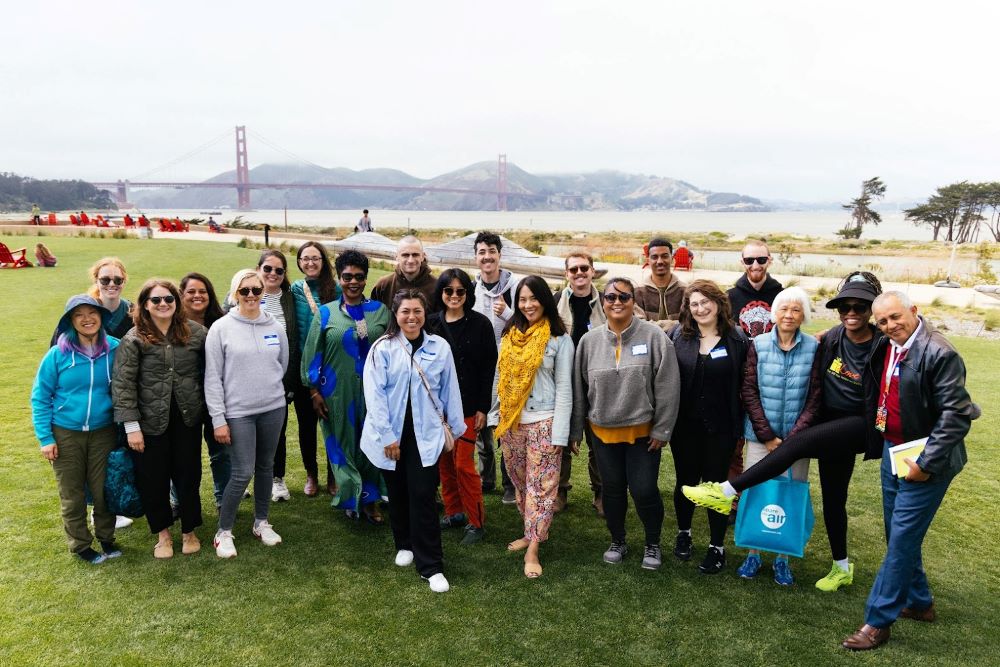Guest blog post by Nasser Albaqqal and videos by Elijah Roberts with Bounce Back Generation. The Sugar and Decoloniality 2.0 series was made possible with funding from the San Francisco Sugary Drinks Distributor Tax. The San Francisco Department of Public Health and Shape Up SF Coalition have utilized the resources generated by the SDDT to bring attention to the complex relationship between sugar, colonialism, and its impact on social, economic, and physical health.
Who doesn’t want a little bit of sweetness in life? Sugary foods and drinks are consumed every day as treats and as a hidden ingredient in processed foods, part of our Standard American Diet (SAD). It started in the 16th century when humans began to increase how much they used sugar. Over the hundreds of years since then, sugar has been hiding some dark secrets, namely its role in the Atlantic slave trade.
For approximately 400 years, millions of enslaved Africans were transported to the Caribbean, South America, and later the United States to work on massive sugar plantations.These plantations generated significant wealth for European colonial powers and their colonists. The term “coloniality” originates from this system that enslaved many, enriched others, and shaped the way the world looks (and eats) today.
The Shape Up SF Coalition and San Francisco Department of Public Health’s Healthy Eating Active Living (HEAL) Team wanted to highlight this connection between the ways sugar has affected us socially, economically, and our physical health. Dr. Amber McZeal is an expert in “Decolonizing the Psyche”. Her Sugar & Decoloniality series helps to reveal how colonization has seeped into so much of our lives today, influencing systems and practices that we take for granted, and becoming embedded in our psyche. We must “decolonize”, peeling back layers of messaging, history, and harms to expose the truth about ourselves as individuals and the traditions and cultures we come from that have been suppressed through centuries of colonization practices.
Bounce Back Generation’s Elijah Roberts participated in the series. The video diaries he shares below reveal how he learned about coloniality during Dr. McZeal’s 4-part series held in San Francisco from April to September 2023. As you will see, the series had a profound impact on him intellectually and emotionally. Learning about decoloniality revealed his connection to his own past and to the cultures and nature we all need to connect and reconnect with. Below is a short description and video of each section.
Coloniality and Sugar (Session 1)
Why look at the sugar industry? Dr. McZeal reveals how the legacy of colonialism, enslavement, and oppression continues to shape sugar production and consumption. Most of today’s sugar comes from lower-income countries where exploitation and economic inequality is all too common. We know the health effects of sugar (diabetes, heart disease, and high blood pressure) affect lower income, and people of color much more frequently. Sugar plays a key role in colonialism, a profoundly brutal phenomenon that continues to damage already marginalized people through the promotion of unhealthy foods. In this video, Elijah talks about recognizing the historical and continuing injustice of the industry.
Decolonizing our Heritage: The Impact of Coloniality and Capitalism (Session 2)
In Session 2, Dr. McZeal explores how colonialism and capitalism have hijacked heritage and culture. We may ask ourselves about our own heritage – what language do you speak, what food do you eat? How much of this has been taken, stolen, or commodified by capitalism? Decoloniality is the act of questioning our knowledge, reframing our thought and taking back ownership of our heritage. Dr. McZeal explains that this process helps us rebuild our connections with indigenous knowledge, our own histories, and each other. In this video, Elijah looks at how capitalism separates us from our culture, heritage, nature, and even our own psyche.
Taking Back Earth: The Impact of Coloniality and Capitalism (Session 3)
Session 3 highlights how colonial industries exploit both people and resources, causing damage to the planet. Dr. McZeal emphasizes the need to appreciate and protect the natural world, acknowledging that humans are a part of it, not its owners. Session 3 focuses on reconnecting with nature and reflecting upon our connection to the planet. In the video below, Elijah reflects on his experience as he is guided through Dr. McZeal’s meditative peace walk around the gardens of San Francisco’s Presidio Tunnel Tops. This exercise serves as an example of how changing our perspectives can affect systems at large. Elijah’s realization of the power of his own personal connection and need for nature demonstrates that we are both a part of the Earth, and it is part of us. As we rebond with the planet, we can influence its health and in doing so influence and improve our own health.
Reflections and Celebrations of Our Coloniality Series (Session 4)
From the exploitative past and present to taking back the pieces of our lives that we lost to coloniality, this final chapter celebrates our journey so far.
We would like to thank Dr. Amber McZeal, the San Francisco Department of Public Health’s HEAL Team, and Shape Up San Francisco for their dedication and effort in creating the sessions and blog series.
Elijah gained so many insights that he shared below and in his final video.
As we gathered to celebrate, I remembered the knowledge and teachings from each session. We must carry this knowledge with us daily and use it to empower ourselves and our communities.
- In session 1, we learned about how we have been wronged by an exploitative system. This knowledge is crucial in understanding the root causes of our struggles and in continuing to fight for justice and equity.
- In session 2, we were reminded to never forget our culture and heritage. This is a powerful message that encourages us to embrace our identities and take pride in who we are. As we continue to reclaim and celebrate our culture, we are also breaking down the colonial mindset that has been forced upon us.
- In session 3, we learned about the importance of the earth in our daily lives. Let us never forget that we are all connected to the planet, and our actions have a direct impact on its health. By being mindful of our environment and our relationship with it, we can work towards creating a more sustainable and harmonious world.
- In session 4 – We remember that our journey is far from over. Our communities are continuously fighting against systemic oppression and injustice. By coming together and reclaiming the pieces of our lives that we lost to coloniality, we are taking powerful steps toward healing and liberation.
Remember how you have been wronged by colonialism and use that knowledge to fuel your passion for justice. Never forget your culture and heritage, and always find ways to celebrate and honor them. Above all, remember that the earth is an integral part of our lives and protect it with all your might. Together, we can continue to break down the effects of coloniality and build a better, more equitable future for all.


